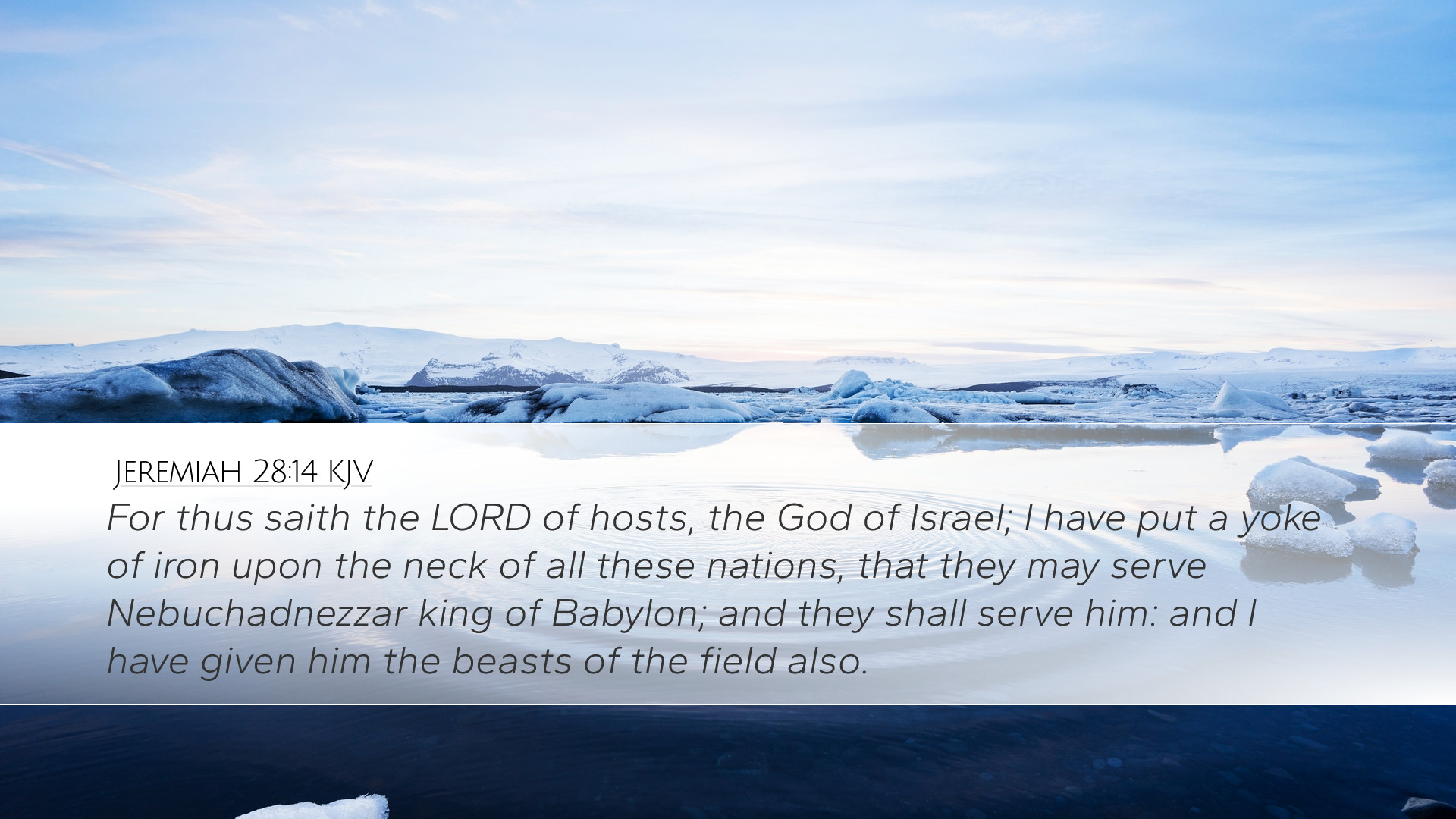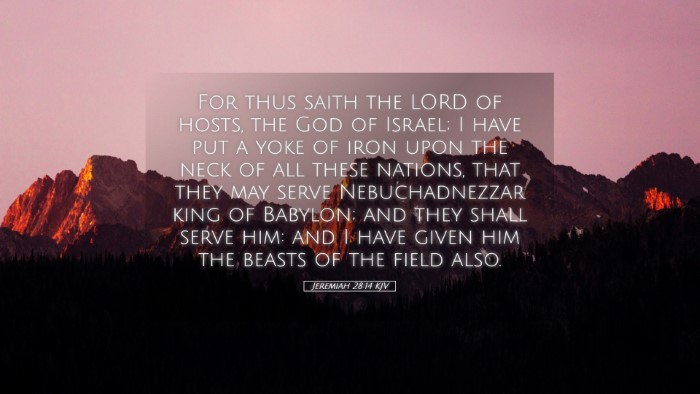Jeremiah 28:14: Commentary on a Prophetic Challenge
Jeremiah 28:14 states, "For thus says the Lord of hosts, the God of Israel: I have put a yoke on the neck of all these nations, that they may serve Nebuchadnezzar king of Babylon; and they shall serve him. I have given him the beasts of the field also." This verse is part of a larger narrative concerning the prophet Jeremiah's confrontation with Hananiah, a false prophet. The contextual setting of this passage holds profound implications for understanding prophetic authority, divine sovereignty, and the nature of Israel's submission to Babylon.
Context and Overview
In the backdrop of the Babylonian threat, Jeremiah is tasked with delivering God's message to a rebellious nation. The dynamics of realpolitik and divine prophecy come to a head as Hananiah proclaims a message of immediate deliverance from Babylonian oppression, directly contradicting Jeremiah’s warnings. Public domain commentators, such as Matthew Henry and Adam Clarke, shed light on this prophetic conflict and its implications for the Jewish people.
Insights from Matthew Henry
Matthew Henry, in his commentary, highlights the stark contrast between the true and false prophets. He emphasizes that Hananiah’s message is appealing yet misguided, driven by a desire to soothe the panic-stricken people. Henry notes that God's original decree is immutable, and while Hananiah speaks of peace, Jeremiah articulates the reality of God's judgment through submission.
-
The Yoke as Symbol of Submission: Henry draws attention to the metaphor of the yoke. In biblical symbolism, a yoke represents control and servitude, indicating that God's people would be under Babylonian rule as part of their divine punishment.
-
The Sovereignty of God: Henry asserts that God’s sovereignty is paramount—even kings and nations are instruments in His hand. The mention of "beasts of the field" signifies God's dominion over all creation, reinforcing that Nebuchadnezzar, irrespective of his own intentions, fulfills God's purposes.
Insights from Albert Barnes
Albert Barnes provides an exegesis emphasizing the theological ramifications of the yoke placed upon the nations. He reflects on the theme of divine authority over earthly powers and the paradox of God's people suffering under foreign oppressors as a consequence of their unfaithfulness.
-
Prophetic Responsibility: Barnes makes it clear that the prophet Jeremiah was to communicate the unavoidable reality of enslavement which countered Hananiah's claims. This serves as a lesson for contemporary believers regarding the weight of prophetic truth over false assurances.
-
The Role of Affliction: He notes that God uses affliction to refine His people, drawing them back to repentance. The yoke, therefore, is not merely a sign of oppression; it is a means by which God orchestrates redemption.
Insights from Adam Clarke
Adam Clarke’s commentary focuses on the historical context and the significance of the yoke as a method of control. He argues that the imposition of a yoke implies a period of processing during which God shapes the character of His people.
-
Historical Background: Clarke details the historical backdrop, explaining how the yoke of Babylon was not merely a political reality but also a theological narrative reflecting Israel's spiritual state.
-
Yoke of Oppression vs. Yoke of Christ: Clarke draws a parallel between the yoke of Nebuchadnezzar and the call of Jesus in the New Testament, where believers are invited to take up His yoke, which is easy and light. This comment serves as a bridge connecting the Old Testament narrative with New Testament theology.
Theological Implications
The implications of Jeremiah 28:14 extend beyond ancient Israel to contemporary faith communities. This verse invites reflection on the nature of prophetic ministry, the tensions between hope and reality, and the belief in God’s ultimate sovereignty amidst suffering.
-
Role of Prophecy: The clash between Hananiah and Jeremiah serves as a discourse on the nature of prophetic ministry. Authentic prophecy involves confronting uncomfortable truths and calling individuals to accountability.
-
Understanding Suffering: The yoke signifies that suffering can serve a divine purpose. Pastors and theologians can utilize this text to teach about growth and transformation in the face of trials.
-
God's Control Versus Human Agency: The verse provokes questions regarding human agency and divine control. It highlights the balance between God’s sovereignty and man’s responsibility, encouraging deeper theological discussions within churches and seminaries.
Conclusion
Jeremiah 28:14 encapsulates a critical juncture in Israel’s prophetic history. Through the insights of Henry, Barnes, and Clarke, this passage offers fertile ground for rich theological and pastoral reflection. It reminds believers of the dichotomy of comfort versus truth, the ultimate authority of God in human affairs, and the potential of suffering to bring about spiritual renewal. For pastors, scholars, and students, this verse is a profound reminder of the weight and responsibility of proclaiming God’s truth in a world fraught with competing narratives.


